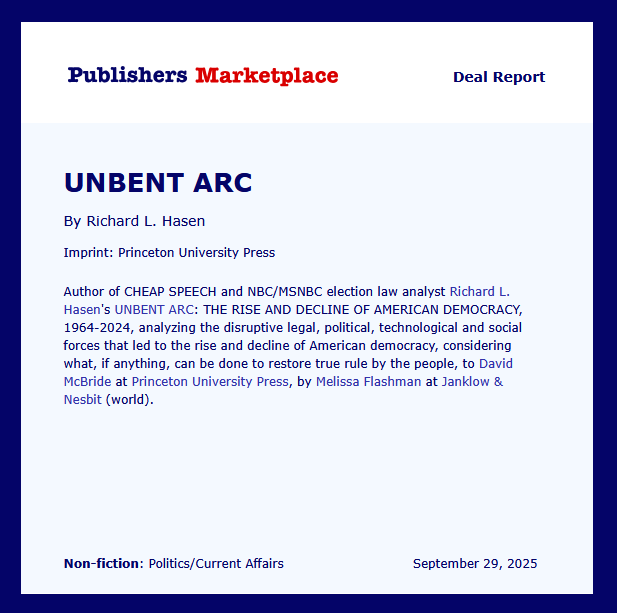A bipartisan ABA Task Force on American Democracy recently endorsed the relegalization of fusion voting as a political reform with significant potential “to combat hyper-partisan polarization and the gridlock in governance that such polarization produces.” State courts have a one-time opportunity to make this happen with legal challenges to existing fusion bans pending in New Jersey, Kansas, and Wisconsin. And New Jersey’s highest court has the opportunity to lead the way. But these courts will have to be persuaded that intervention would be a genuine vindication of individual rights, not an instance of judicial activism in favor of a different set of, admittedly, better election rules.
In Fusion and the Freedom to Associate to a Better Politics, recently presented at a symposium of the Kansas Law Review, and now posted on SSRN, Michael L. Thomas, Jr. and I explain how courts should understand the constitutional burdens of anti-fusion laws and why the analysis in Timmons v. Twin Cities Area New Party (1997) is thin and unpersuasive.
The associational lens, we argue, provides the sharpest take on the constitutional harm. In this post, I offer a preview of the argument at its most basic level in the hopes that this will be intriguing enough to encourage people to read the full article.
Anti-fusion laws infringe on a ballot-qualified minor party’s freedom to associate with its top-choice candidate.
Anti-fusion laws block minor parties from nominating (associating) with their preferred candidate when the candidate is also the candidate of a major party. Anti-fusion laws, thus, essentially force ballot-qualified minor parties to run their second-best friend (or no friend at all). This, we argue, is a direct interference with the constitutionally guaranteed freedom of association. Just as each of us treasures whom we associate with, so too a party cares, and has a basic right to choose, who it associates with through its ballot line.
The associational infringements deepen when we consider the rationale: Anti-fusion laws deprive minor parties of the right to run their best friend because, apparently, three is a crowd. Surely, however, if all parties agree to work together, three is not a crowd, but a political alliance.
The state’s move is particularly pernicious if we consider that our system was explicitly designed to ensure that a numeric minority would not be able to exercise political power unless it formed political alliances to ensure majority support. Remember our dear framer, James Madison, in Federalist No. 10.
By preventing minor parties from forming such alliances, anti-fusion laws undercut a minor faction’s only path to political responsiveness: by alliance. Indeed, political alliances through fusion have been the primary way that minor parties have historically vindicated their interests: abolition, maximum hour laws, the Australian ballot and other democratic reforms, to name just a few. Indeed, it was through fusion that the Populist movement reshaped American politics throughout the West in the late nineteenth century.
Anti-fusion laws also infringe the associational freedom of individual voters.
Anti-fusion laws arbitrarily prevent voters from associating with a viable candidate without associating with a major party they despise. Where a state bars fusion, voters who align politically with a minor party are forced to choose between:
- “wasting” their vote on the minor party’s SECOND-BEST CANDIDATE or
- casting their vote for A COMPETITIVE CANDIDATE on the line of A MAJOR POLITICAL PARTY, they don’t align with.
A rational voter is going to choose the latter. The only other alternative is to opt out entirely.
Anti-fusion laws thus arbitrarily deprive voters of “[t]he right to associate with the political party of [their] choice;” a right, the Court, in Kusper v. Pontikes (1973), recognized as “an integral part of . . . constitutional freedom.”
Today, these associational burdens fall heaviest on independents, the largest self-identified group in national party identification polling. Fusion, by contrast, allows for a genuine freedom of association. It allows individual voters to associate with their true political allies, while still backing viable candidates. Moreover, by empowering voters to both register for and cast their ballots in support of candidates on the minor party line, it promotes clarity about their preferences in ways that enhance democratic responsiveness and accountability.
Anti-fusion laws also place a direct burden on the ability of ballot-qualified minor parties to manifest their true associational strength.
Anti-fusion laws artificially depress the true associational strength of an already ballot-qualified minor party while hindering its capacity to grow. Anti-fusion laws ensure that election results never accurately reflect the minor party’s real level of support, thereby impeding the ability of political parties to gain supporters (candidates, donors, voters) or form coalitions.
To be clear, the problem is not that fusion gives minor parties a lift up; it is rather that anti-fusion laws artificially depress minor party association.
These are severe burdens on the freedom of association, rendering anti-fusion laws unconstitutional whether a court chooses to apply strict scrutiny or the more forgiving Anderson-Burdick test. The U.S. Supreme Court’s contrary decision in Timmons is based on a misunderstanding of the rights and burdens at stake in these cases.
While the lower courts in the state litigation have followed Timmons’ misguided approach, we hope that state supreme courts will do better. Striking down anti-fusion bans would empower the many in the electorate who feel unrepresented by the two major parties, and offer a realistic opportunity for independent and unaffiliated voters to build political power through non-spoiler minor parties within the confines of the American two-party system. But it would also be legally right: Anti-fusion laws unconstitutionally infringe on fundamental and constitutionally protected rights of political association.


